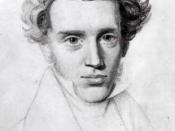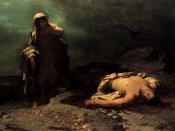"The tyrant dies and his rule ends, the martyr dies and his rule begins." (Kierkegaard) In Sophocles's Antigone, this quote is proven time and time again. If a tyrant's rule is to end, by death or otherwise, their popularity will diminish as the people realize they have been misled. The opposite is true for a martyr. The moment a martyr is made, by dying of their belief, people will begin to respect and follow in the teachings of this person. Creon, the tyrant, and Antigone, the martyr, are excellent examples of the truths in Kierkegaard's quote.
Moments into the play, the tyrant is obviously Creon. He makes a law stating that Polyneices, Antigone's brother, shall not be buried, since he was a traitor to the city of Thebes. Antigone goes against Creon's order and buries her brother, even though she knows that she will be put to death it.
She believes that what she is doing is the will of the gods, which is superior to the laws of man. This sets her up to be the martyr of the story.
Creon regards the laws he sets forth for the land to be superior to any other, including the laws of the gods. Anyone who would attempt to break his laws would be punished severely, regardless of their reasoning. The people of Thebes understand his new law goes against the will of the gods, but are too afraid to speak out, much like any group of people in history are frightened of a powerful tyrant. Henceforth, Creon's role as a tyrant is cemented. If the people were to finally become bold and speak out, Creon's rule would be over even before he dies. However, if the people were to have never said...


